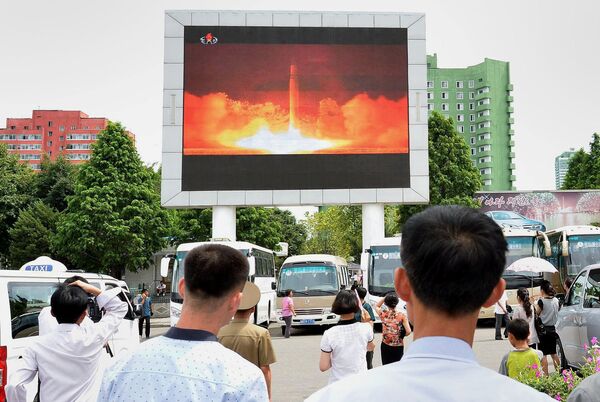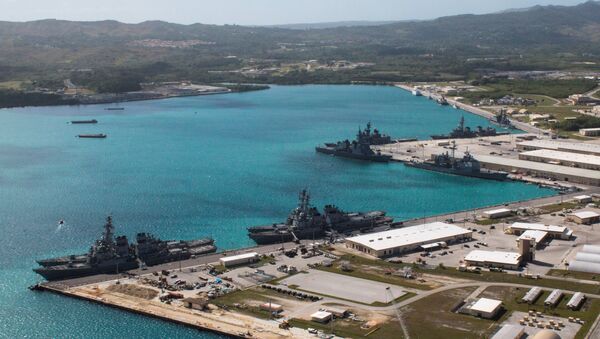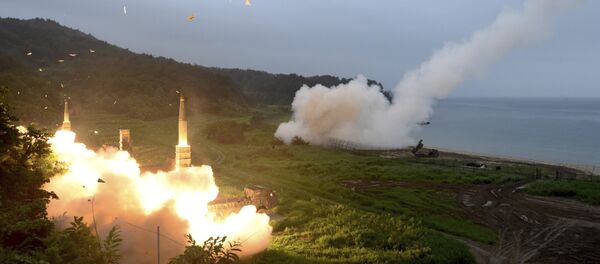Washington's unwillingness to hold a dialogue on the Korean crisis with Pyongyang is adding fuel to the fire in the region, Evgeny Kim, a senior fellow at the Center for Korean Studies of the Institute of Far Eastern Studies at the Russian Academy of Sciences, told Radio Sputnik.
"Americans are adding fuel to the fire. Why did they bring strategic bombers to the Guam [military] base and conduct training bombings? The North [North Korea] is ready for negotiations," Kim emphasized.
Tensions continue to escalate on the Korean Peninsula with the US leadership signaling "military solutions are now fully in place."
"Military solutions are now fully in place, locked and loaded, should North Korea act unwisely. Hopefully, Kim Jong Un will find another path!" US President Donald Trump tweeted Friday.
Military solutions are now fully in place,locked and loaded,should North Korea act unwisely. Hopefully Kim Jong Un will find another path!
— Donald J. Trump (@realDonaldTrump) 11 августа 2017 г.
"Two US Air Force B-1B Lancers assigned to the 37th Expeditionary Bomb Squadron, deployed from Ellsworth Air Force Base, South Dakota, flew from Andersen Air Force Base, Guam, for a 10-hour mission, flying in the vicinity of Kyushu, Japan, the East China Sea, and the Korean peninsula, August 7, 2017 (HST)," the report said.
Earlier this summer, Moscow and Beijing issued a joint statement offering ways to de-escalate the situation. Russia and China have repeatedly called upon Pyongyang to stop nuclear tests at the same time urging Washington and Seoul to refrain from conducting joint drills.
However, the vicious cycle of the US and North Korea's mutual threats has yet to be broken.

Earlier this week North Korea's military announced that it was considering a missile attack near the US territory of Guam in response to Trump threatening Pyongyang with "fire and fury."
The Korean Central News Agency (KCNA) reported Thursday that by mid-August Pyongyang will have a plan to launch four intermediate-range missiles at the US territory of Guam, where American military bases are located.
"The Hwasong-12 rockets to be launched by the KPA [Korean People's Army] will cross the sky above Shimane, Hiroshima and Koichi Prefectures of Japan," General Kim Rak-gyom, who commands the Korean People's Army's Strategic Force, stated as quoted by the media outlet.
The same day a lawmaker of Russia's upper house of parliament, Viktor Ozerov, told Sputnik that Russia had put on high alert its air defense systems in the country's Far East due to the escalation of the Korean crisis. The information was later denied by the Sputnik source in the Eastern Military District.
"The units of the Armed Forces of the Russian Federation in the Far East, including air defense battalions, are serving in normal mode. There were no orders for increased combat readiness," the source told Sputnik.
Commenting on the issue, Kim highlighted that the time has come for the US and North Korea to meet at the negotiating table.
"Americans should probably accept a joint proposal by Russia and China that both nuclear tests of the DPRK and military exercises involving the United States from the Korean Peninsula should be suspended simultaneously. Stop it and start negotiating," Kim stressed.
"There is but one thing to do — to hold negotiations and one should exert pressure on the Americans. By the way, in this very case, I believe we can receive some support from South Korea: its leadership also says that it is necessary that the Americans begin talks with the northerners," the academic told Radio Sputnik.
Kim expressed his confidence that the North Koreans wouldn't strike first.
"North Korea's missiles won't fly in the direction of Guam," he said. "Most likely if something happens, US missiles will be fired. Of course, our [Russian] air defense systems could intercept them, but it is necessary to conduct a policy which would prevent such a course of events."




